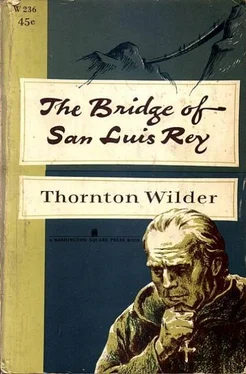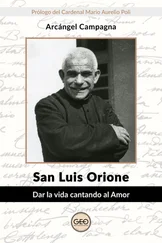“Then you don’t damn me to hell because ... it looks like I came between you and the Perichole?”
“Damn you to ...? What makes you say that? You’re going crazy, Esteban; you’re imagining things. You haven’t had any sleep, Esteban. I’ve been a curse to you and you’re losing your health because of me. But you’ll see, I won’t trouble you much more. How could I damn you to hell, Esteban, when you’re all I’ve got? Understand, see, that when the cold cloths go on, I just lose myself, see. You know. Don’t think about it twice. It’s time to put them on now. I won’t say a word.”
“No, Manuel, I’ll skip this time. It won’t do you any harm, I’ll just skip this time.”
“I’ve got to get well, Esteban. I’ve got to get up soon, you know. Put them on. But one minute—give me the crucifix. I swear by the blood and body of Christ that if I say anything against Esteban, I don’t mean it and it’s just the foolish words when I’m dreaming because of the pain in my leg. God make me well again soon, amen. Put it back. There. Now I’m ready.”
“Look, Manuel, it won’t hurt if I skip just this once, see. It’ll be good for you, sure, to not get it all stirred up just this once.”
“No, I’ve got to get well. The doctor said it had to be done. I won’t say a word, Esteban.”
And it would begin all over again.
During the second night a prostitute in the next room started beating on the wall, outraged at such language. A Priest in the room on the other side would come out into the hall and beat on the door. The whole floor would gather before the room in exasperation. The innkeeper came up the stairs, loudly promising his guests that the brothers would be dumped into the street the very next morning. Esteban, holding his candle, would go into the hall and permit them to rage at him for as long as they pleased; but after that he took to pressing his hand firmly over his brother’s mouth during the moments of greatest stress. This increased Manuel’s personal rage at him and he would babble all through the night.
On the third night, Esteban sent for the priest and amidst the enormous shadows Manuel received the sacrament, and died.
Thereafter Esteban refused to come near the building. He would start off upon long walks, but presently drifting back, would hang about, staring at passers-by, within two streets of where his brother lay. The innkeeper failing to make any impression upon him and remembering that the boys were brought up at the Convent of Santa María. de las Rosas, sent for the Abbess. Simply and soundly she directed all that was to be done. At last she went down to the street corner and spoke to Esteban. He watched her approach him, a glance mixed of longing and distrust. But when she stood near him he turned sideways and looked away.
“I want you to help me. Won’t you come in and see your brother? Won’t you come in and help me?”
“No”
“You won’t help me!” A long pause. Suddenly as she stood there full of her helplessness there flashed through her mind an incident of many years before: the twin brothers about fifteen years old were sitting at her knee and she was telling them the story of the crucifixion. Their large grave eyes were fixed upon her lips. Suddenly Manuel had cried out loudly: “If Esteban and I had been there we would have prevented it.”
“Well, then, if you won’t help me, will you tell me which you are?”
“Manuel,” said Esteban.
“Manuel, won’t you come and just sit with me up there for a short time?”
After a long pause: “No.”
“But Manuel, dear Manuel, can’t you remember as children how you did so many things for me? You were willing to go across the town on some little errand. When I was ill you made the cook let you bring me my soup?” Another woman would have said: “Do you remember how much I did for you?”
“Yes.”
“I, too, Manuel have lost. I too ... once. We know that God has taken them into His hands. ...” But this did not do at all. Esteban turned vaguely and walked away from her. When he had gone about twenty paces he stopped and stared down a side-street, like a dog who wants to go away, but is reluctant to offend the master who calls him back.
That was all they could get out of him. When the fearful procession passed through the city, with its black hoods and masks, its candles in broad daylight, its display of heaped-up skulls, its terrifying psalms, Esteban followed it in the parallel streets, catching glimpses of it from a distance, like a savage.
All Lima was interested in this separation of the brothers. Housewives whispered together sympathetically about it as they unfurled their carpets from the balconies. The men in the wineshops, alluding to it, shook their heads and smoked in silence for a while. Travellers from the interior told of seeing Esteban as he strayed with eyes like coals along the dried-up beds of rivers or through the great ruins of the, old race. A herder of llamas had come upon him standing upon a hilltop, asleep or dazed, wet with dew under the stars. Some fishermen surprised him swimming far out from shore. From time to time he would find work to do, he would become a shepherd or a tarter, but after a few months he would disappear and stride from province to province. But he always returned to Lima. One day he appeared at the door of the Perichole’s dressing-room; he made as though to speak, gazed earnestly at her and vanished. One day a sister came running into the office of Madre María del Pilar with the news that Esteban (whom the world called Manuel) was lingering about the door of the convent. The Abbess hurried out into the street. For months she had been asking herself what strategy could reconcile this half-demented boy to living among them again. She assembled as grave and calm a manner as she was able and appearing at the street door murmured “My friend” and looked at him. He gazed back at her with the same glance of longing and distrust that he had shown her before, and stood trembling. Again she whispered “My friend” and moved a step forward. Suddenly Esteban turned and breaking into a run disappeared. Madre María del Pilar rushed stumbling back to her desk and fell upon her knees, exclaiming angrily: “I have prayed for wisdom and You have given me none. You have not chosen to give me the least grace. I am a mere scrubber of floors. ...” But during the penance she set herself for this impudence the thought came to her to send for Captain Alvarado. Three weeks later she had a ten-minute conversation with him. And the next day he started for Cuzco where, it was said, Esteban was doing some copying for the University.
There was this strange and noble figure in Peru during these years, the Captain Alvarado, the traveller. He was blackened and cured by all weathers. He stood in the Square with feet apart as though they were planted on a shifting deck. His eyes were strange, unaccustomed to the shorter range, too used to seizing the appearances of a constellation between a cloud and a cloud, and the outline of a cape in rain. His reticence was sufficiently explained for most of us by his voyages, but the Marquesa de Montemayor had other light on the matter. “ Captain Alvarado is bringing you this letter in person ,” she wrote to her daughter. “ Introduce him to some of your geographers, my treasure, though it may make them a little uncomfortable, for he is the diamond of sincerity. They will never see anyone who has travelled so far. Last night he described to me some of his voyages. Imagine him pushing his prow through a sea of weeds, stirring up a cloud of fish like grasshoppers in June; or sailing between islands of ice. Oh, he has been to China and up the rivers of Africa. But he is not merely an adventurer; and he seems to take no pride in discovering new places; nor is he a mere merchant. One day I asked him narrowly why he lived so, and he avoided my question. I found out from my laundress what I think is the reason of his wandering: My child, he had a child; my daughter, he had a daughter. She was just old enough to cook a holiday meal, and do a little sewing for him. In those days he merely sailed between Mexico and Peru and hundreds of times she waved him farewell or welcome. We have no way of knowing whether she was more beautiful or intelligent than the thousands of other girls that lived about him, but she was his. I suppose it seems ignoble to you that a great oak of a man should go about the world like a blind man about an empty house merely because a chit of a girl has been withdrawn from it. No, no, you cannot understand this, my adored one, but I understand and grow pale. Last night he sat with me and talked of her. He laid his cheek against his hand and looking into the fire, he said: ‘It sometimes seems to me that she is away upon a voyage and that I shall see her again. It seems to me that she is in England.’ You will laugh at me, but I think he goes about the hemispheres to pass the time between now and his old age .”
Читать дальше












